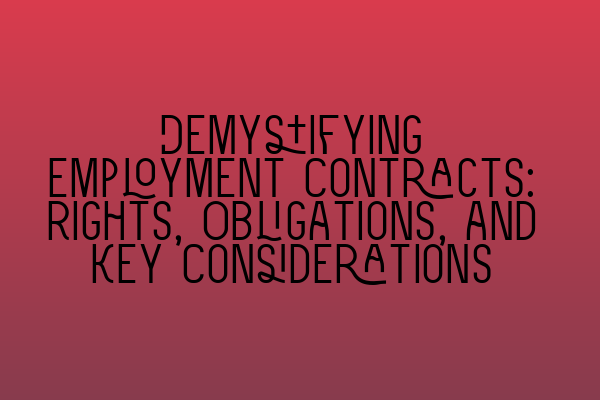Demystifying Employment Contracts: Rights, Obligations, and Key Considerations
As an employee, understanding your rights and obligations under an employment contract is crucial to ensure a smooth working relationship and protect your interests. In this blog post, we will demystify employment contracts, highlighting key considerations you should keep in mind. Whether you’re starting a new job or looking to negotiate the terms of your existing contract, this article will equip you with the knowledge to make informed decisions.
1. Introduction to Employment Contracts
An employment contract is a legally binding agreement between an employer and an employee that outlines the terms and conditions of their working relationship. These contracts cover various aspects, such as job duties, compensation, working hours, benefits, termination procedures, and more.
2. Understanding Your Rights
Knowing your rights as an employee is essential for ensuring fair treatment in the workplace. Employment contracts should adhere to relevant labor laws and regulations, guaranteeing fundamental rights such as minimum wage, working hour limits, and protection against discrimination and harassment. Familiarize yourself with the legislation applicable to your jurisdiction to assert your rights effectively.
3. Obligations of the Employee
Employment contracts specify the duties and responsibilities expected from the employee. These obligations may include punctuality, professional conduct, confidentiality, and loyalty to the employer. By fulfilling your obligations, you not only contribute to a positive work environment but also lay the foundation for a strong professional reputation.
4. Obligations of the Employer
Employers also have obligations under employment contracts. These may include providing a safe working environment, paying the agreed-upon salary, offering benefits and entitlements, ensuring equal opportunities, and complying with employment laws. Being aware of your rights helps hold employers accountable for fulfilling their obligations.
5. Key Considerations in Employment Contracts
a. Job Description: Ensure that the contract accurately reflects your job title, duties, and responsibilities. This clarity helps avoid ambiguity and ensures you are adequately compensated for your work.
b. Compensation and Benefits: Examine the contract thoroughly to understand your salary, bonuses, commission structures, and any additional benefits such as health insurance, retirement plans, or paid leave.
c. Termination Clauses: Pay attention to the terms governing contract termination, including notice periods and severance pay. Understanding these provisions can safeguard your rights in case of unforeseen circumstances.
d. Non-Compete and Non-Disclosure Agreements: Some contracts may include clauses restricting your ability to work for competitors or share company information. Understand the scope and duration of these restrictions before signing.
e. Dispute Resolution: Contracts often include provisions for resolving disputes through alternative methods such as mediation or arbitration. Familiarize yourself with these mechanisms and evaluate their fairness and adequacy.
6. Seeking Legal Advice
If you have concerns or questions about your employment contract, it is advisable to seek legal advice from a contract law specialist. Professional advice can help you understand the terms, negotiate amendments, or take appropriate action if your rights are violated.
7. Additional Resources
To further enhance your understanding of contract law and preparation for the SQE exams, consider exploring the following related articles:
– SQE 1 Practice Exam Questions
– SQE 1 Practice Mocks FLK1 FLK2
– SQE 2 Preparation Courses
– SQE 1 Preparation Courses
– SRA SQE Exam Dates
In conclusion, understanding employment contracts is vital for both employees and employers. By knowing your rights and obligations, carefully reviewing the terms, and seeking legal advice when necessary, you can ensure a fair and mutually beneficial working relationship. Remember, an employment contract sets the foundation for your professional journey, so take the time to read, understand, and negotiate where appropriate.
